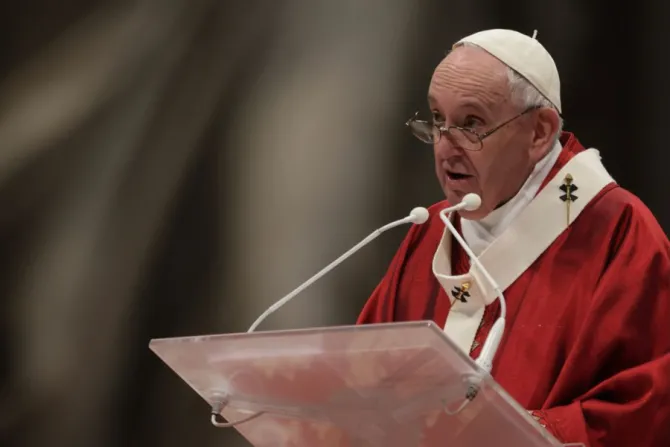Pope Francis celebrates Pentecost Sunday Mass in St. Peter’s Basilica, May 23, 2021./ EWTN News/Daniel Ibáñez/Vatican Pool
Pope Francis today urged those who feel trapped by loneliness, despair, and pain to open themselves to the Holy Spirit.
Celebrating Pentecost Sunday Mass in St. Peter’s Basilica May 23, the pope said that people could find true consolation by invoking the third Person of the Holy Trinity.
He said: “Dear sister, dear brother, if you feel the darkness of solitude, if you feel that an obstacle within you blocks the way to hope, if your heart has a festering wound, if you can see no way out, then open your heart to the Holy Spirit.”
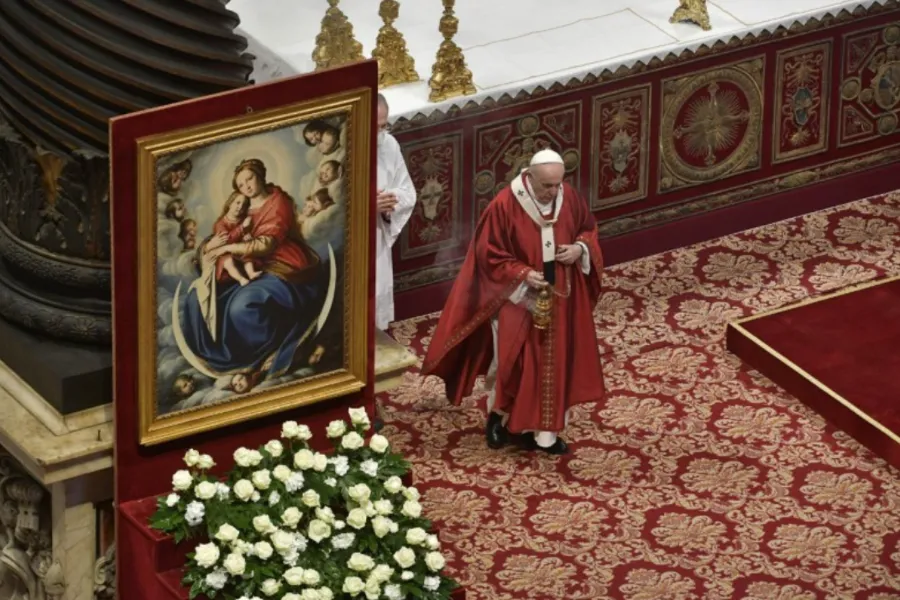
The pope celebrated the live-streamed Mass, marking the descent of the Holy Spirit on the Apostles in Jerusalem, at the high altar beneath Bernini’s bronze baldachin. A limited number of people attended the Mass due to continuing coronavirus restrictions.
After the entrance antiphon, the pope blessed the congregation with holy water using an aspergillum. The first reading, Acts 2:1-11, was read in Spanish and the second reading, Galatians 5:16-25, in English.
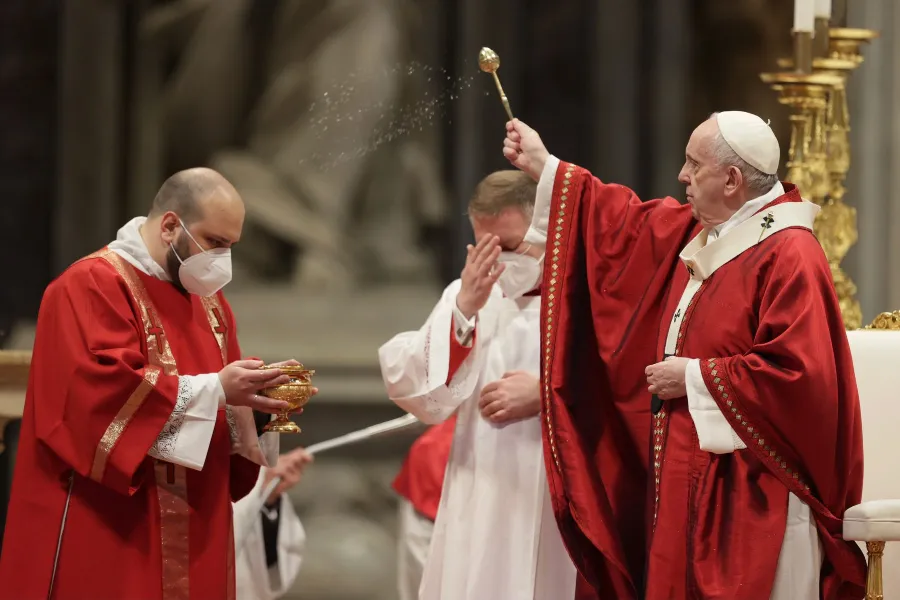
The pope preached after the Gospel reading, John 15: 26-27, 16: 12-15, in which Jesus promises that he will send the Paraclete to his disciples.
He said that the word “Paraclete” was difficult to translate because it has several meanings. Principally, he said, it means “Consoler” and “Advocate.”
The consolation offered by the Holy Spirit is different from that offered by the world, the pope said.
“The comforts of the world are like a pain reliever: they can give momentary relief, but not cure the illness we carry deep within,” he said.
He noted that St. Bonaventure, a 13th-century Franciscan theologian, wrote that “where the trials are greater, he brings greater comfort, not like the world, which comforts and flatters us when things go well, but derides and condemns us when they do not.”
The pope commented: “That is what the world does, that is especially what the hostile spirit, the devil, does. First, he flatters us and makes us feel invincible (for the blandishments of the devil feed our vanity); then he flings us down and makes us feel that we are failures. He toys with us. He does everything to cast us down, whereas the Spirit of the risen Lord wants to raise us up.”
He recalled that the Holy Spirit descended on the Apostles when they were lost and afraid after the Crucifixion.
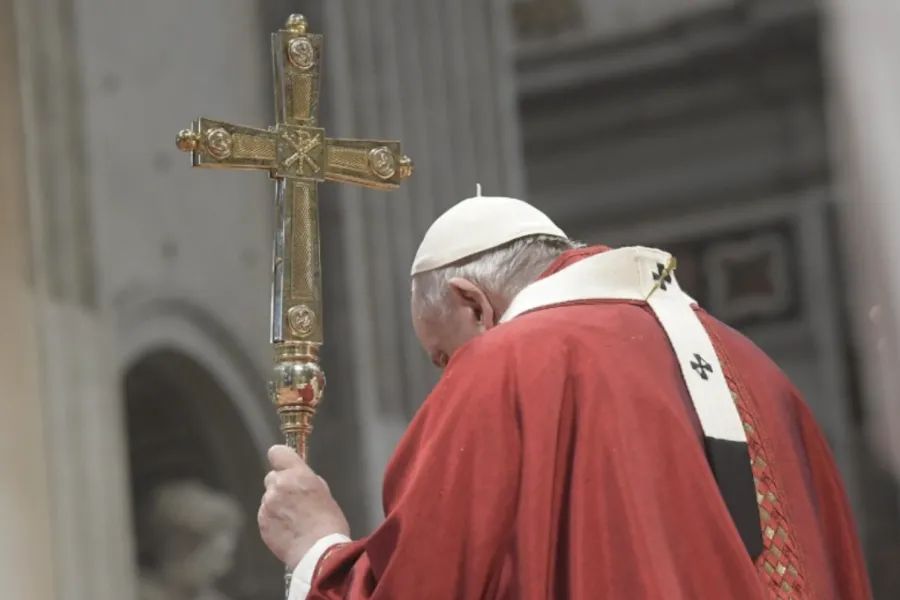
“The years they had spent with Jesus had not changed them: they were no different than they had been,” he said. “Then, they received the Spirit and everything changed: the problems and failings remained, yet they were no longer afraid of those them, nor of any who would be hostile to them.”
The pope said that those who receive the Holy Spirit are called, in turn, to “become paracletes,” or comforters, to others.
“How can we do this?” he asked. “Not by making great speeches, but by drawing near to others. Not with trite words, but with prayer and closeness. Let us remember that closeness, compassion, and tenderness are God’s ‘trademark,’ always.”
He continued: “The Paraclete is telling the Church that today is the time for comforting. It is more the time for joyfully proclaiming the Gospel than for combatting paganism.”
“It is the time for bringing the joy of the Risen Lord, not for lamenting the drama of secularization. It is the time for pouring out love upon the world, yet not embracing worldliness. It is more the time for testifying to mercy, than for inculcating rules and regulations.”
“It is the time of the Paraclete! It is the time of freedom of heart, in the Paraclete.”
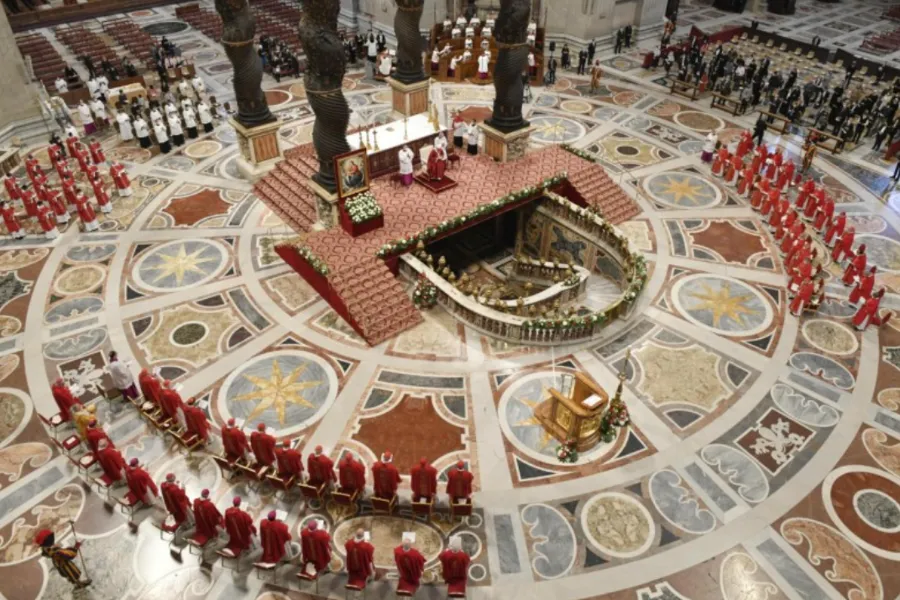
Turning to the Holy Spirit’s title of “Advocate,” Pope Francis explained that in Jesus’ time, lawyers would not speak for the accused, but stand beside them, quietly suggesting arguments that the accused could offer in their defence.
He said that the Paraclete did the same today, helping us to distinguish truth from falsehood.
“He does so discreetly, without forcing us: he proposes but does not impose. The spirit of deceit, the evil one, does the opposite: he tries to force us; he wants to make us think that we must always yield to the allure and the promptings of vice,” he said.
He added that the Holy Spirit commonly offers three pieces of advice: “Live in the present,” “Look to the whole,” and “Put God before yourself.”
He said: “The Paraclete affirms the primacy of today, against the temptation to let ourselves be paralyzed by rancor or memories of the past, or by uncertainty or fear about the future.”
“The Spirit reminds us of the grace of the present moment. There is no better time for us: now, here and now, is the one and only time to do good, to make our life a gift. Let us live in the present!”
The Paraclete also urges us to embrace the whole, rather than a part, he said, creating unity from diversity.
“Today, if we listen to the Spirit, we will not be concerned with conservatives and progressives, traditionalists and innovators, right and left. When those become our criteria, then the Church has forgotten the Spirit,” he observed.
“The Paraclete impels us to unity, to concord, to the harmony of diversity. He makes us see ourselves as parts of the same body, brothers and sisters of one another. Let us look to the whole! The enemy wants diversity to become opposition and so he makes them become ideologies. Say no to ideologies, yes to the whole.”
The pope said that the Holy Spirit’s third suggestion, putting God first, was “the decisive step in the spiritual life.”
“The Spirit affirms the primacy of grace,” he said. “Only by emptying ourselves, do we leave room for the Lord; only by giving ourselves to him, do we find ourselves; only by becoming poor in spirit, do we become rich in the Holy Spirit.”
“This is also true of the Church. We save no one, not even ourselves, by our own efforts. If we give priority to our own projects, our structures, our plans for reform, we will be concerned only about effectiveness, efficiency, we will think only in horizontal terms and, as a result, we will bear no fruit. An ‘-ism’ is an ideology that divides and separates.”
He continued: “The Church is human, but it is not merely a human organization, it is the temple of the Holy Spirit. Jesus brought the fire of the Spirit to the earth and the Church is reformed by the anointing of grace, the gratuity of the anointing of grace, the power of prayer, the joy of mission, and the disarming beauty of poverty. Let us put God in first place!”
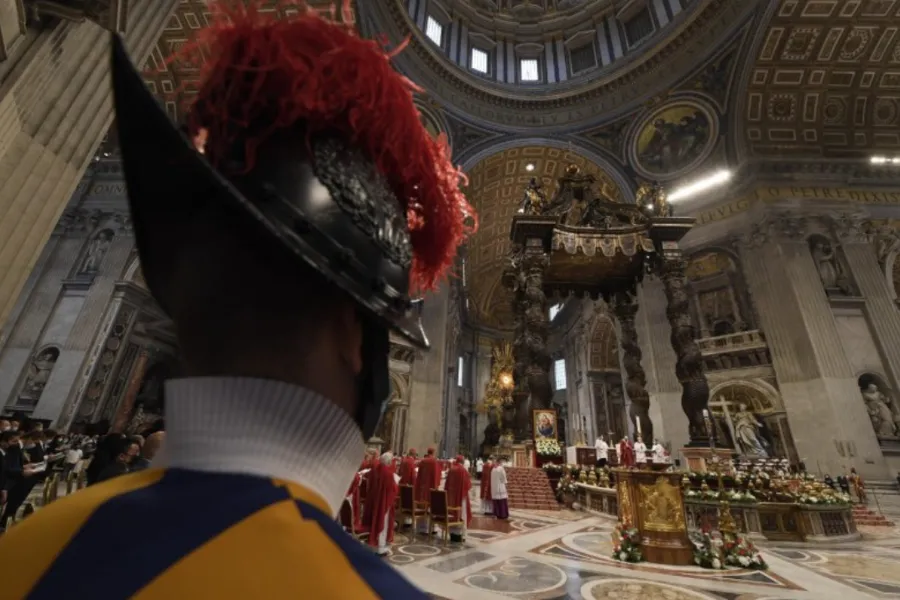
On the eve of Pentecost, Pope Francis sent a video message to Christians attending an ecumenical prayer vigil at Christ Church, an Anglican church in the Old City of Jerusalem.
He said: “Can the world today say of Christians, of them: ‘see how they love one another’ or can they say with truth, ‘see how they hate one another,’ or ‘see how they fight’?”
“What has happened to us? We have sinned against God and against our brothers. We are divided, we have broken into a thousand pieces what God has made with so much love, compassion, and tenderness. We all, all of us, need to ask for forgiveness, to the Father of all, and we also need to forgive ourselves.”
The Pentecost Vigil was organized by the Catholic Charismatic Renewal International Service (CHARIS). The pope praised the organization for promoting Christian unity through the vigil.
“Brothers and sisters, tonight can be a prophecy, it can be the beginning of the witness that we Christians, together, have to give to the world: to be witnesses of God’s love that has been poured into our hearts by the Holy Spirit who has been given to us,” he said.
The pope ended his homily in St. Peter’s Basilica with a prayer: “Holy Spirit, Paraclete Spirit, comfort our hearts. Make us missionaries of your comfort, paracletes of your mercy before the world.”
“Our Advocate, sweet counsellor of the soul, makes us witnesses of the ‘today’ of God, prophets of unity for the Church and humanity, and apostles grounded in your grace, which creates and renews all things. Amen.”
Image Credit: EWTN News/Daniel Ibáñez/Vatican Media
Source: CNA

